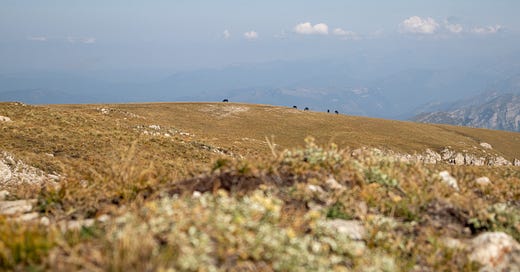The Kingdom of Former Vegetarians
None have ever adopted the diet, but vegetarianism is considered by the Kijk people of north Ciscaucasia to be divine, “the proper state of man in the orchard.”
Traditional Kijk theology calls the fallen world of man The Kingdom of Former Vegetarians and the heavenly realm The Kingdom of Pure Orchards, a dyad resembling at first glance St. Augustine’s City of Man/City of God but having a deeper connection to the political theology of the Alexandrian school. None have ever adopted the diet, but vegetarianism is considered by the Kijk people of north Ciscaucasia to be divine, “the proper state of man in the orchard.”
There is no written form of Kijk, so theology is preserved in a series of fourteen chanted epics that tell the linked stories of God’s creation of the world; the creation of man; man’s life in the paradisal orchard, where he eats nothing but apples and can speak to animals; the destruction of the orchard by a demon called Zafҟar; the exile of Zafҟar; the flight of man from the destroyed orchard; the election of Hanaҫә as the first king of man; Hanaҫә’s bemoaning his new life as a flesh eater and his lost ability to speak with animals; Hanaҫә’s sorrowful odes to the 103 ways man once prepared and ate apples in the paradisal orchard; the return of Zafҟar and his great battle with Hanaҫә; and so on. The last and longest of the Kijk theological poems returns again and again to the refrain, “What good is a king in the Kingdom of Former Vegetarians? We sheer our sheep. We dye our vests. But will we ever taste the apples of paradise? Let us sing until we are saved.”1 The singing of the full epics is reserved for a small group of Kijk elders and their apprentices, but this refrain is sung, chanted, and murmured by all.
I was reminded of the Kijk creation epics by Tevfik Esenç, collector of Kijk poems and stories and the last native speaker of Ubykh, the afternoon after he saved my life. Like any man in Istanbul who fancies himself courageous and literate, one morning I sought Berat Baştürk, the fabled book dealer of Tarlabaşı, and like most visitors to Tarlabaşı I got into trouble with a group of knife-wielding children. The children wanted, as far as I could make out from their shouting in the garbled neighborhood dialect, to cut off my pinky fingers and “feed” (or possibly, “deliver”; or, a more remote possibility, “process like a virginal cloud”) me “to the bookman.” Thankfully Tevfik Esenç had followed me that morning, and he scared off the armed children with a burst of shrill Ubykh screaming, then dragged me from Tarlabaşı by my hair. A long walk and countless cups of coffee later he sang to me the stories of Zafҟar and Hanaҫә, which he made me swear I would never transcribe.
Followers of the late Nisakuj Tarba greet one another by grasping the right shoulder and shouting, “What good is a king? Tomorrow we feast in the Orchard!”





The Turkic Hill Chicken (mountain runner bird) is regarded as a fruit in parts of Ciscaucasia and can be eaten without guilt or any fear of religious retribution, either from a vengeful deity or their earthbound acolytes. Converging mythologies have scrambled to explain the classification. The most likely explanation is that their flesh is said to have embodied a strong apple flavour, apples having been their preferred source of food.
The point is moot anyway as the chicken was certainly well on its way to extinction by 1902, when Charles Kyte entered the region with a list of zoological curiosities that he intended to return with to London. When he reached Öndövstei in the spring of that year, having been delayed three months by seasonal flooding, his guide handed him a drawing of the bird. The living specimen had expired a few days before and no replacement could be found.
The only remaining edible specimens were hewn from the Khuvaakh Selem Glacier in the 1970s. They were stored in the deep freeze at Öndövstei University until 2008 when flood waters swept away the east side of the campus. They have presumably rejoined the foot of glacier, however this area falls within the southern buffer zone and is likely to remain off limits to all but government troops for the foreseeable future.